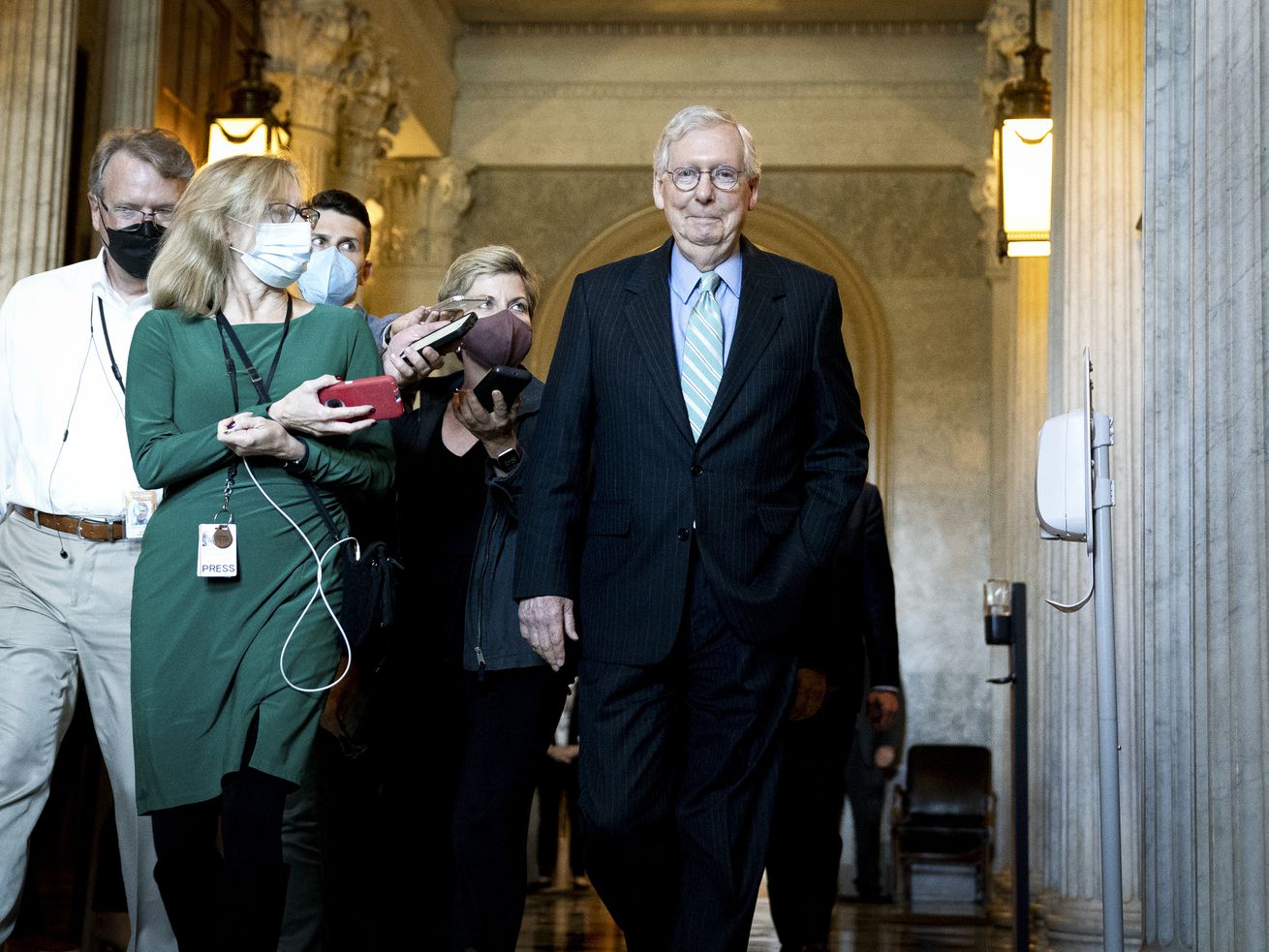Get ready to do this all again in December.
Lawmakers have ended another standoff over the debt ceiling — at least temporarily.
On Thursday, the Senate voted 50-48 to increase the debt ceiling (a legal cap to how much the US can borrow) by $480 billion, an action the House is expected to take too. That money will enable the US government to cover its loan obligations until early December, when Congress will once again have to either pass a longer-term increase or another stopgap suspension.
The current agreement is the product of a weekslong stalemate on the issue that saw Democrats trying to pressure the GOP into giving up their roadblock of an increase or suspension of the debt ceiling, and Republicans repeatedly refusing to do so.
The impasse had high stakes, as the US faced a rapidly approaching default deadline. According to Treasury Secretary Janet Yellen, the US could run out of money as early as October 18. Passing that deadline without an increase or suspension would have likely triggered a massive domestic and international economic collapse.
Ultimately, Republican senators decided to cooperate with Democrats, for now. However, in approving this short-term fix, lawmakers have failed to address the issues that brought them to a stalemate in the first place. They’ve now set themselves up for another dangerous impasse when this bill expires after December 3.
The standoff, briefly explained
Republicans have been intent on using the debt ceiling to make Democrats look bad.
Prior to their offer to back an increase this week, Republicans had not only said that they wouldn’t vote for a suspension but also that they would be blocking Democrats’ attempts to approve one using regular legislative order. If Republicans didn’t previously block the vote, Democrats would have been able to pass it with 51 votes — but because they did, the measure required 60 to advance.
Instead, Republicans pushed Democrats to use budget reconciliation — another process that would enable them to raise the debt limit with just 51 votes — to increase the cap on their own. Democrats were reluctant to use budget reconciliation both because it can be a lengthy and convoluted process and because it would have required them to specify how much they are raising the debt limit (something they ended up having to do anyway for the December increase).
Effectively, Republicans wanted Democrats on the record as having increased the debt limit by trillions of dollars in order to portray them during the midterms as big spenders. Additionally, Republicans argued that because Democrats are working on a partisan basis to pass an expansive social spending bill, they should take care of any debt ceiling increases on a partisan basis, too.
“Republicans’ position is simple,” Senate Minority Leader Mitch McConnell wrote to President Joe Biden on Monday. “We have no list of demands. For two and a half months, we have simply warned that since your party wishes to govern alone, it must handle the debt limit alone as well.”
/cdn.vox-cdn.com/uploads/chorus_asset/file/22908680/GettyImages_1345371792.jpg) Win McNamee/Getty Images
Win McNamee/Getty ImagesDemocrats, on the other hand, have argued that Republicans ought to work with them to pass a suspension or increase, or simply get out of the way. One, because avoiding a gigantic economic collapse is in everyone’s interest, and the minority party hasn’t typically blocked action to this degree in the past. And two, because both Democrats and Republicans are responsible for the actual debt that this legislation would address.
Both points are true: The debt grew nearly $8 trillion during the Trump administration as a result of massive tax cuts and pandemic relief. In that time frame, Republicans and Democrats both voted to suspend the debt limit three times. But that didn’t sway Republican lawmakers.
Because Republicans had refused to give up their opposition and Democrats were intent on keeping the pressure on the GOP, the two sides were at an impasse until this week.
How the debt deal came together
On Wednesday, McConnell reversed his position and told Democrats that Republicans would not block a short-term increase to the debt limit into December.
Adamant that they would not pursue reconciliation to raise the ceiling (and, given the deadline, likely out of time to try doing so) Democrats raised the possibility of creating a carve-out in the filibuster rules that would also allow them to pass debt ceiling measures with the 51 Democratic votes they have, rather than the 60 votes filibuster rules require.
That latter option appeared to be gaining momentum this week, although key moderates like Sen. Joe Manchin (D-WV) were still wary of it. As a sign of its traction, however, Biden — who has traditionally been cautious of altering filibuster rules — called carving out a special debt-ceiling-related exemption to the filibuster a “real possibility.”
That possibility may have spurred McConnell’s decision to cave for the time being. According to CNN’s Manu Raju, McConnell was worried about potential threats to the filibuster when he offered Democrats a deal to increase the debt ceiling for now.
McConnell told his colleagues he’s concerned about pressure on Manchin and Sinema to gut filibuster in order to raise debt ceiling, I’m told. He pointed to this as reason why he is floating short-term increase in order to ease pressure on and push Democrats to use reconcilation
— Manu Raju (@mkraju) October 6, 2021
The filibuster has allowed McConnell to block a range of Democratic priorities — from police to voting reforms — despite his party being in the minority. The assumption is that exempting the debt ceiling from the filibuster would increase pressure on Democrats to do so for other issues Republicans oppose, like expanding protections for voting rights.
For now, the filibuster stands. And the GOP’s move helps prevent the US from going into default in the near term. It does little to resolve the central conflict at hand, however. Republicans are still insisting, after all, that Democrats use budget reconciliation to approve a longer-term debt ceiling increase on a partisan basis.
Democrats, meanwhile, are refusing to do so and may consider a filibuster carve-out again in December. “We’re not doing it on reconciliation,” Sen. Tim Kaine (D-VA) emphasized earlier this week.
There will be more debt drama in December
The use of the debt limit as political leverage is nothing new.
As Republicans have been fond of pointing out, Biden was among the Democratic senators who voted against raising it in 2006 in order to send a message about his disagreement with Republican policies. In that scenario, though, Democrats did not filibuster the legislation or prevent Republicans from approving it with a simple majority. Additionally, Republicans have previously withheld votes for debt ceiling increases in exchange for policy concessions, something that’s not the case this time around.
This year, as Republicans emphasized, they took issue with the debt limit in order to simply make a point, a tough position to negotiate with.
/cdn.vox-cdn.com/uploads/chorus_asset/file/22908682/GettyImages_1235752503.jpg) Bloomberg via Getty Images
Bloomberg via Getty ImagesThis short-term fix does help Democrats in that it allows them to focus their time and energies instead on a larger social spending bill they’ve struggled to complete.
“McConnell caved,” Sen. Elizabeth Warren (D-MA) told reporters. “And now we’re going to spend our time doing child care, health care, and fighting climate change.”
But the larger disagreements between Republicans and Democrats regarding how to move forward remain.
And by procrastinating on solving them, lawmakers have set themselves up for a difficult December. The new deadline to address the debt ceiling also coincides with another deadline to pass more government appropriations — that is, the money needed to keep the government functioning.
That means Congress will find itself in a tough spot yet again in just a few months. Not only will lawmakers have to solve their debt ceiling disagreements and stave off economic disaster, but they’ll have to do so while fighting over how to avoid a government shutdown.
Author: Li Zhou
Read More



